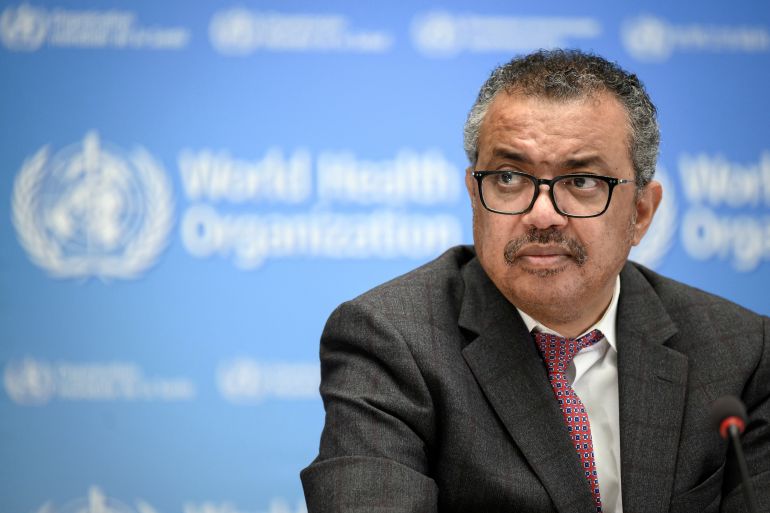Ethiopia’s Tigray is under a ‘systematic’ blockade: WHO chief
Tedros Adhanom Ghebreyesus also said Tigrayans across the country were being profiled and arrested by the thousands.

Ethiopia’s conflict-torn Tigray region is under “systematic blockade”, the World Health Organization (WHO) director-general has said, warning that people were starving to death and dying from lack of access to medicine.
“People are dying because of lack of supplies,” Tedros Adhanom Ghebreyesus, himself from Ethiopia’s northern embattled region, told reporters on Friday in Geneva.
Keep reading
list of 3 itemsUN says Ethiopia detained 72 drivers working for WFP
Tigray rebels accused of raping women in Ethiopia’s Amhara region
The UN health agency, Tedros said, “cannot send supplies and medicines to Tigray because it’s under blockade, and the blockade is systematic”. The WHO’s chief did not say who he thought was stopping aid getting through to Tigray, where the Tigray People’s Liberation Front (TPLF) has been fighting a year-long war with Ethiopia’s government forces.
Soon after the conflict erupted, the Ethiopian army’s chief of staff accused Tedros of backing the Tigray rebels. He denied the allegation. The WHO director-general, who was Ethiopia’s health minister during the era when the TPLF dominated national politics, has repeatedly said he is not taking sides in the war.
Prime Minister Abiy Ahmed’s government has denied blocking aid to the region and has said it is rebuilding infrastructure. The UN has repeatedly called on the government to get aid into the north, and has said that shortages there are “man-made”.
No aid has gone into the region by road since October 18, and 364 trucks are stuck in the capital of Afar “pending authorisation from the authorities to proceed”, the UN said on Thursday in a weekly report on the humanitarian situation.
Assistance from the WHO and other aid organisations to the region had shrivelled to “almost nothing”, said Tedros. “So no medicine. People are dying. No food. People are starving. No telecommunication. They are isolated from the rest of the world. No fuel. No cash,” he added.
The WHO chief also lamented how Tigrayans across the country were “being profiled and arrested en masse, by the thousands.”
“This is blatant and open,” he said.
The government last week announced a six-month nationwide emergency amid rising concerns that Tigrayan fighters and allied Oromo Liberation Army (OLA) rebels could advance on the capital. The move triggered a fresh wave of mass arrests that has further hobbled the aid response.
Lawyers say arbitrary detentions of ethnic Tigrayans have surged since then, with the new measures allowing the authorities to hold anyone suspected of supporting “terrorist groups” without a warrant. Law enforcement officials describe such detentions as part of legitimate operations against the TPLF, which has been designated a “terrorist” group by the government.
Ethiopia’s government has denied targeting Tigrayans based on their ethnicity. “There is no systematic arrest … because of your profile,” Redwan Hussein, state minister for foreign affairs, told Al Jazeera on Wednesday.
“Since the state of emergency actually set up by the government, people are vigilant so citizens are watching out in their neighbourhoods and each other for possible attacks. So people might inform the police if they see something unusual,” he said.
Some 22 UN staffers have been arrested in the raids that rights groups say target ethnic Tigrayans, and the UN has also sounded the alarm about 72 drivers contracted by the World Food Programme who have been arrested in Afar.
The government describes such arrests as legitimate.